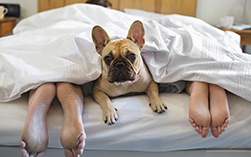Better in Bed Survey Results
Better Sleep Council Research Finds Men Earn Bragging Rights When it Comes to Bedtime Performance, Women Fall Short

ALEXANDRIA, VA – May 1, 2018 – Today the Better Sleep Council (BSC), the consumer education arm of the International Sleep Products Association (ISPA), released its findings from a new survey on America’s bedtime performance as it relates to sleep regimen, finding that men outperformed their female counterparts, but both have room to improve.
Participants were asked about their bedtime habits and received a ranking based on best practices when it comes to sleep behaviors, such as turning off electronics before bed, keeping a regular bedtime, etc. On average, Americans* earned a grade of a “C-” (70%) but looking at the sexes side-by-side, men nudged out women for bed rest with an average score of 72%. However, when drilling into specific habits that contribute to a good night’s sleep, men stood out in the bedroom. Results also took into consideration participants’ overall satisfaction with the quantity and quality of their sleep, such as feeling well-rested, pleased with the amount of sleep they get, etc.
“Over the past few years, the Better Sleep Council has noticed that people aren’t bragging about how little sleep they’re getting, they’re bragging about how much sleep they are getting. In fact, getting enough quality sleep is becoming a status symbol among Americans,” said Mary Helen Rogers, vice president of marketing and communications for ISPA. “Through our survey, we wanted to learn for ourselves – ‘how good is America in bed?’ Results from the survey found that Americans aren’t walking the talk.”
Differing Bedtime Habits between the Sexes
Women are particularly deficient when it comes to getting enough sleep: Despite 84% of women believing sleep is important to their overall health and wellness, their bedtime habits and lifestyles have created barriers to get the desired amount of sleep. The two areas where women particularly fell short were ability to fall asleep and ability to rise in the morning. The survey revealed that 34 million women experience trouble sleeping and/or staying asleep almost all the time (21%), and nearly 20 million hit the snooze button numerous times every day (12%).
Loved ones also kept women up at night. Survey results found that more than 24 million women were likely to let kids and pets in the bed (15%), compared to 4 million men (3%).
According to the study, men were more likely to engage in positive sleep habits: 55 million men reported sleeping alone (35%), 22 million follow a strict bedtime – even on the weekends (14%), 35 million do not have caffeinated beverages past noon (22%), and more than 55 million keep their stress level to a minimum (35%).
Other Sleep Indicators
Additional key sleep performance takeaways from the survey include:
- 77 million Americans (24%) claim they have no electronics in their bedroom, not even a television.
- How this impacts sleep: The blue light emitted by the screens on cell phones, computers, tablets and televisions restrains the production of melatonin, keeping you from getting the quality sleep you need.
- 174 million Americans (54%) rarely/never drink alcohol before bed.
- How this impacts sleep: For the 46% of Americans who reported drinking alcohol, it’s best to drink it in the early evening. Generally, it takes 1 hour to metabolize one ounce of alcohol, which can wreak havoc on sleep quality.
- 193 million Americans (60%) have a mattress that’s less than 7 years old.
- How this impacts sleep: Experts advise you to evaluate your mattress after 7 years for wear and tear. An older mattress may no longer provide the comfort and support that is key for quality sleep.
Quality Sleep Is “In”
Although the survey shows that there are areas where everyone can improve, the shift in the way Americans are talking about their own sleep habits is encouraging. Gone are the days of touting the lack of sleep Americans are getting – consumers want others to know just how good they are in bed, as it relates to sleep.
Capitalizing on this trend, the BSC has launched the Better in Bed campaign during Better Sleep Month to support this positive movement of consumers striving not just for more sleep each night, but for quality, restorative sleep as well.
“Better Sleep Month is the perfect time to engage consumers with entertaining and useful tips to up their game between the sheets,” said Rogers. “Throughout the month of May, the BSC will be providing sleep solutions, so everyone can brag about how good they are in bed and, most importantly, for everyone to sleep just a little more soundly.”
To learn more about Better Sleep Month, visit bettersleep.org.
*Based on the 2017 U.S. Census Bureau population estimate of 323,127,513 Americans.
About the BSC
The Better Sleep Council is the consumer-education arm of the International Sleep Products Association, the trade association for the mattress industry. With decades invested in improving sleep quality, the BSC educates consumers on the link between sleep and health, and the role of the sleep environment, primarily through www.bettersleep.org, partner support and consumer outreach.
Shop With Confidence

Decide what you like and don't like before buying a mattress when you take our Better Bed Quizzz.
Get Better in Bed

Sign up now for The Snoozzze: news you can sleep on. Learn about sleep tips, the latest sleep research and more!
Related Articles
- Slide under the Sheets, Grab Your Favorite Pillow – It’s Time to Get Better in Bed
- What the Royal Wedding Can Teach Me About Sleeping Better
- News about naps – what you need to know for a better catnap
- It’s Not All Fluff: Your Pillow May Be Robbing You of Sleep
- It's Time to Strip Your Sheets ... and a Whole Lot More
- Discover ways to adjust to the time change this spring, so you can snooze comfortably.
- A Good Night’s Rest Each Day Will Keep the Heartache Away